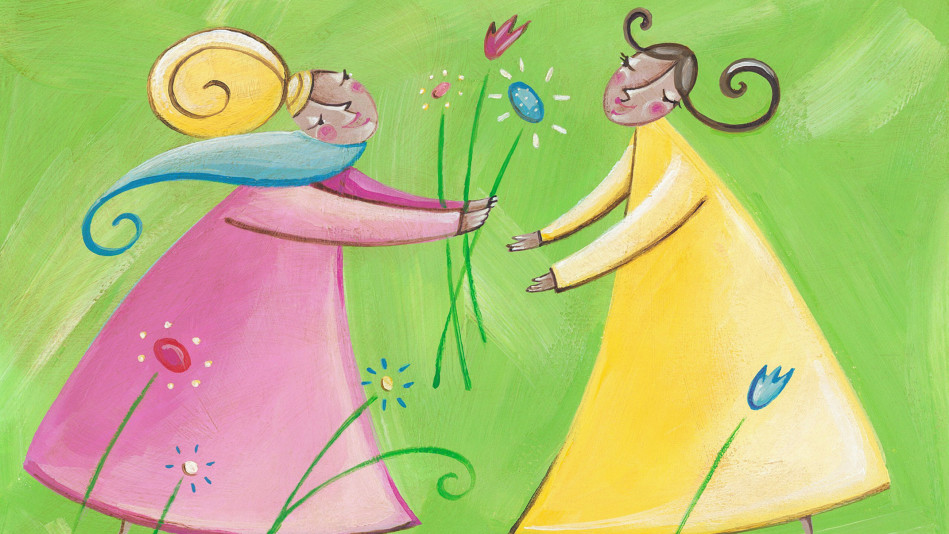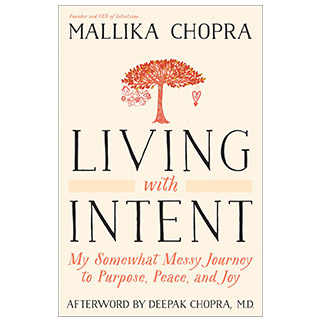The 10-Minute Change That Leads to Peace and Self-Acceptance
The author of Living With Intent—and daughter of Deepak Chopra—reminds us how to find our own kind of grace each and every day.

Illustration: Linda Bronson/Ikon Images/Getty Images
Today is like so many days. I'm running late for a meeting and instantly start beating myself up. Why are you so stupid? Why didn't you just leave the house a little earlier? Why didn't you take a better route? Then I notice my thoughts. Uh-oh, I think. There I go, criticizing myself again. Instead of berating myself, I think through the situation and tell myself it's no big deal. What's 10 minutes one way or the other? But when I arrive late, as I'd expected to, and look around the room at the faces of the people who are gathered, I realize why I was so stressed.
I wasted their time. And that's disrespectful. For me, it's not so much about being punctual or tardy; but rather, it's about being considerate of people I care about. I want to honor my commitments and my relationships. And those are things I value. So, I offer a sincere apology, without the buffer of some trumped-up excuse (a tactic I've resorted to in the past). The tension in the room lifts, everyone smiles, I feel good about owning my bad behavior and relieved that I've been forgiven.
The incident reminds me of something I read about gratitude and social interactions in Dr. Robert A. Emmons's book, Thanks!; so, when I return home, I flip through it and find this: "Naikan is a practice of self-reflection that can help us 'see the reciprocal quality of relationships."' Emmons quotes Gregg Krech, who wrote Naikan: Gratitude, Grace, and the Japanese Art of Self-Reflection: "If we are not willing to see and accept those events in which we have been the source of others' suffering, then we cannot truly know ourselves or the grace by which we live."
I'm stopped by the phrase the grace by which we live. I think about where the grace in my life comes from, the true blessings—and notice that it's mostly from other people; the friends and family who give my life meaning, of course, and the many nameless people I interact with during the day: the guy who lifted my carry-on bag into the overhead bin on the plane not long ago, the little boy who ran after me to return the car keys I'd unknowingly dropped while walking down the street. Even the drivers who give way so I can exit the freeway when I need to. To fulfill my intent to be there for friends and family, and the many strangers I come in contact with, I need to be grateful not only for the gifts they provide me, but also conscious about both the gifts I provide them and the ways in which I wound them, anger them and disappointment them. It's a tall order. One I can't hope to perfectly fill. But the idea of seeing my interactions in the context of mutual support and gratitude strikes a chord deep within me.
We all have so many things to be grateful for, but they're often the last things we think about. I believe we should try to think about these things every day. What are you grateful for? What are the small things you take for granted that make your life special, more vibrant and more magical—or just plain easier?
 This adapted excerpt was taken from Living With Intent: My Somewhat Messy Journey to Purpose, Peace, and Joy by Mallika Chopra.
This adapted excerpt was taken from Living With Intent: My Somewhat Messy Journey to Purpose, Peace, and Joy by Mallika Chopra.
I wasted their time. And that's disrespectful. For me, it's not so much about being punctual or tardy; but rather, it's about being considerate of people I care about. I want to honor my commitments and my relationships. And those are things I value. So, I offer a sincere apology, without the buffer of some trumped-up excuse (a tactic I've resorted to in the past). The tension in the room lifts, everyone smiles, I feel good about owning my bad behavior and relieved that I've been forgiven.
The incident reminds me of something I read about gratitude and social interactions in Dr. Robert A. Emmons's book, Thanks!; so, when I return home, I flip through it and find this: "Naikan is a practice of self-reflection that can help us 'see the reciprocal quality of relationships."' Emmons quotes Gregg Krech, who wrote Naikan: Gratitude, Grace, and the Japanese Art of Self-Reflection: "If we are not willing to see and accept those events in which we have been the source of others' suffering, then we cannot truly know ourselves or the grace by which we live."
I'm stopped by the phrase the grace by which we live. I think about where the grace in my life comes from, the true blessings—and notice that it's mostly from other people; the friends and family who give my life meaning, of course, and the many nameless people I interact with during the day: the guy who lifted my carry-on bag into the overhead bin on the plane not long ago, the little boy who ran after me to return the car keys I'd unknowingly dropped while walking down the street. Even the drivers who give way so I can exit the freeway when I need to. To fulfill my intent to be there for friends and family, and the many strangers I come in contact with, I need to be grateful not only for the gifts they provide me, but also conscious about both the gifts I provide them and the ways in which I wound them, anger them and disappointment them. It's a tall order. One I can't hope to perfectly fill. But the idea of seeing my interactions in the context of mutual support and gratitude strikes a chord deep within me.
We all have so many things to be grateful for, but they're often the last things we think about. I believe we should try to think about these things every day. What are you grateful for? What are the small things you take for granted that make your life special, more vibrant and more magical—or just plain easier?
 This adapted excerpt was taken from Living With Intent: My Somewhat Messy Journey to Purpose, Peace, and Joy by Mallika Chopra.
This adapted excerpt was taken from Living With Intent: My Somewhat Messy Journey to Purpose, Peace, and Joy by Mallika Chopra.



